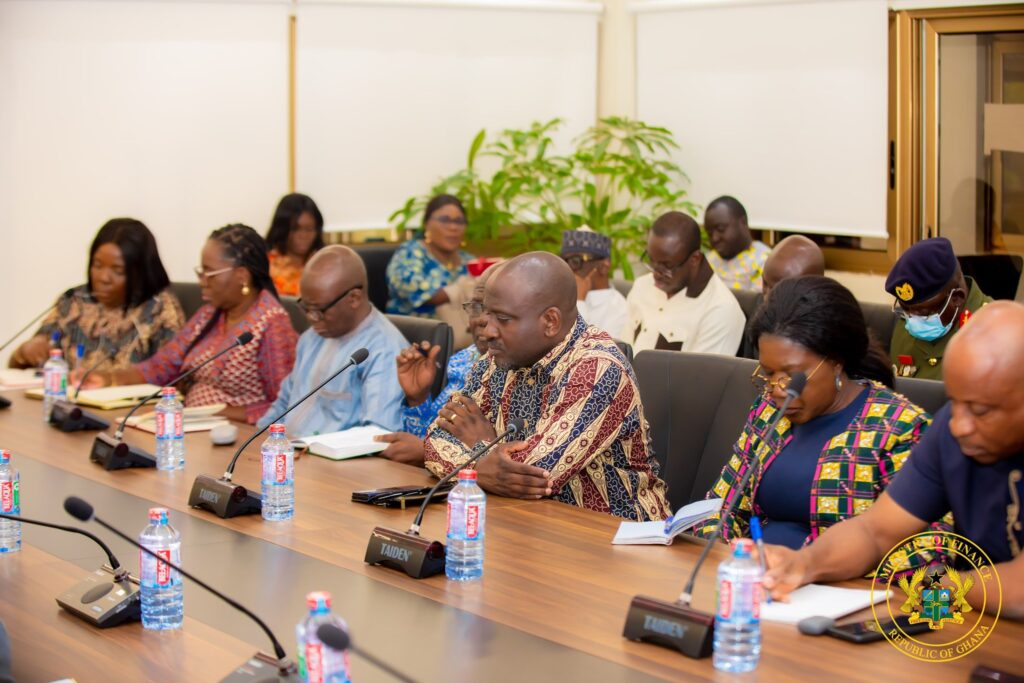In a bold move to enforce fiscal discipline across government institutions, the Minister for Finance, Dr Cassiel Ato Forson, has issued a sweeping directive mandating that, effective immediately, no government contract shall be awarded without prior commencement authorisation from the Ministry of Finance.
Speaking at a recent meeting with Chief Directors and senior officials of various Ministries, Departments, and Agencies (MDAs), Dr Forson signalled a departure from what he termed “business as usual” in Ghana’s public financial management.
“It is in full alignment with the recently amended Public Financial Management Act, 2025. I made it unequivocally clear: You cannot award contracts without the express approval of the Ministry of Finance”.
Dr Cassiel Ato Forson, Ghana’s Minister of Finance
According to the Finance Minister, the directive is a decisive step to enforce fiscal discipline, ensure accountability, and end the culture of financial recklessness in public administration.

Dr Forson made it emphatically clear that every government contract must now be preceded by a commencement certificate issued by the Ministry of Finance.
“Let me repeat: No commencement certificate, no procurement,” he warned. Far from being a mere bureaucratic requirement, Dr Forson stressed that this process is now a strict legal obligation.
He warned that any breach of the directive, will attract serious consequences, including personal liability for principal spending officers who defy the rule.
“The Ministry of Finance will no longer carry the weight of fiscal indiscipline alone. If you are a principal spending officer and you violate this directive, you will be held personally accountable.”
Dr Cassiel Ato Forson, Ghana’s Minister of Finance

Ghana’s Financial Indiscipline
For over three decades, Ghana’s Fourth Republic has teetered on the edge of economic instability, a precarious position reminiscent of the fiscal crises that precipitated the collapse of previous republics.
Despite numerous initiatives aimed at reforming public financial management (PFM), the nation continues to grapple with systemic inefficiencies and fiscal indiscipline.
The IMANI Centre for Policy and Education, in its fiscal reckless report, covering the period between 2021 and 2023, identified GHS 4.9 billion in financial irregularities, a figure that highlights a significant lack of fiscal discipline within the public sector.
According to the report, from 2021 to 2023, the government’s ministries, departments and agencies (MDAs) recorded a total of GHS 4.9 billion in financial irregularities.
This, according to the policy think-tank, is nearly double the combined budget allocated to the Ministry of Gender, Children, and Social Protection during the same period, a stark indicator of the extent of financial wastage.
Given the above, the Finance Minister called on all public officials to act with integrity and a deep sense of national duty, reminding them that their privileged positions come with an enormous responsibility to safeguard public resources.
“We must not continue to subject our people to hardship through negligence or abuse of public resources. Restoring trust in public service begins with transparency, responsibility, and discipline in implementing the national budget. That journey starts now.”
Dr Cassiel Ato Forson, Ghana’s Minister of Finance
The directive represents a critical pivot in the government’s ongoing efforts to restore fiscal credibility and improve the management of public finances, especially as Ghana continues to recover from economic challenges that have strained its resources and undermined public confidence.

Ghana’s Commitment to IMF Reforms
In a related development, Dr Forson has reaffirmed Ghana’s unwavering commitment to achieving food security and staying on course with its International Monetary Fund (IMF) programme reforms.
This assurance came during a recent meeting with the Canadian High Commissioner to Ghana, H.E. Myriam Montrat, where the Minister outlined the government’s priorities and key initiatives.
“Food security is Ghana’s current priority,” Dr Forson stated, underlining the urgent need to build resilience in agriculture and rural economies.
He emphasized that beyond macroeconomic stability, the government is keenly focused on securing the country’s food supply chain, especially in the face of climate-related disruptions and global economic volatility.
Dr Forson also used the meeting to reassure the Canadian envoy of Ghana’s steady progress under the IMF-supported programme.
He explained that the government has taken decisive corrective actions to address fiscal slippages inherited from the previous administration and has moved quickly to meet key structural benchmarks.

A major highlight of Ghana’s economic revitalisation strategy, Dr Forson noted, is the Goldbod initiative—a new scheme aimed at strengthening the country’s gold sector management and boosting foreign exchange earnings.
He described Goldbod as a “true game changer” for Ghana’s economy, stressing its importance in driving sustainable development and economic diversification.
While acknowledging the operational setbacks that Cocobod has recently faced—largely attributed to mismanagement—Dr Forson was quick to defend the overall contributions of the cocoa sector to Ghana’s national development.
He cautioned against allowing isolated failures to obscure the broader successes that initiatives like Goldbod could achieve. “Indeed, we cannot let these isolated setbacks derail a promising initiative like the Goldbod,” he said.
Dr Forson’s remarks underscore the National Democratic Congress government’s deep commitment to fiscal prudence, transparency, and sustainable development, setting a new standard for public financial management and national development.





















